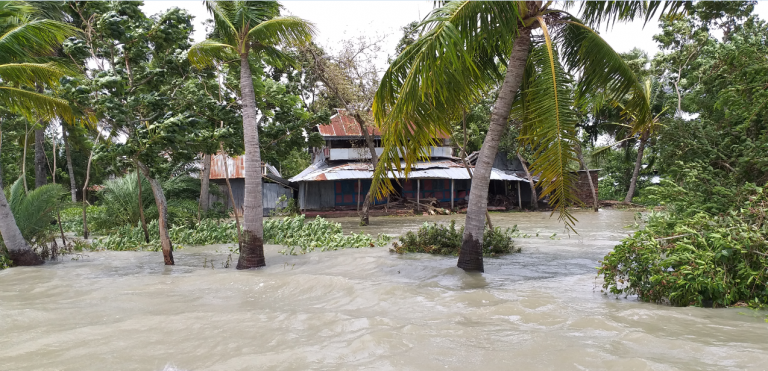Vision: The core objectives of the research hub will be to identify challenges and new strategies to effectively measure, model and predict human displacement following a disaster, explore the root causes of climate mobility and displacement in the face of extreme weather events and anthropogenic climate change, and transform our cutting-edge research into practice and promote locally-led sustainable solutions to address the needs of the displaced and trapped communities.
The hub was inaugurated on the 15th of June 2022 during the UCL Humanitarian Summit and is led by Dr Bayes Ahmed jointly with IDMC.
Background: Displacement by disasters and climate change has reached an endemic level in many parts of the world, regularly reaching around 25 million people displaced each year. Now three times more people are displaced by extreme weather events than by conflicts and violence. The United Nations Office for Disaster Risk Reduction (UNDRR) and Intergovernmental Panel on Climate Change (IPCC) recognised climate change as a potent driver of involuntary migration and disaster displacement as a tremendous humanitarian challenge of the 21st century.
The IPCC WGII Sixth Assessment Report (2022) highlights that climate and weather extremes are increasingly driving displacement in all regions, mainly where climate hazards interact with high vulnerability and low adaptive capacity. This trend of human displacement will increase with the intensification of heavy precipitation and associated flooding, tropical cyclones, drought and, increasingly, sea-level rise.
Likewise, the Groundswell Part-2 report (2021) estimates that as many as 216 million people could move within their own countries due to slow-onset climate change impacts by 2050. In addition, the Internal Displacement Monitoring Centre (IDMC) warns that displacement by disasters is regularly reaching around 25 million people each year, which is often higher than people displaced by conflicts and violence. In contrast, even a much higher number of people are trapped in the climatic hotspots making them significantly vulnerable to continuing poverty, land and water degradation, loss of livelihoods and ecosystems, food insecurity, health hazards and increased inequality.
Yet, to date the climate mobility sector never received adequate attention and the phenomenon is not sufficiently understood and policy responses require more solid and actionable evidence. Against this background, we aim to establish a globally unique and pioneering research hub in collaboration with the Internal Displacement Monitoring Centre (IDMC), the leading organisation in this arena. Our work is international, interdisciplinary and ground-breaking as it focuses on the complex nexus between climate change adaptation, disaster risk reduction and sustainable development.
Future plans
- Developing a Continuing Professional Development (CPD) or Massive Open Online Course (MOOC) on disaster displacement and climate mobility.
- Generating awareness among the public and media, and producing targeted policy briefs for key decision-makers.
- Securing research grants and funding for conducting large-scale, multidisciplinary and innovative research projects and creating opportunities for PhDs and research fellows.
- Publishing joint articles and technical reports of global importance.
- Organising workshops, policy dialogues, professional trainings, webinars, and international conferences on a regular basis.
Why UCL?
UCL has a long and proud history of working with refugees, war survivors and minority communities. For example, the contribution of the Migration Research Unit based in the Department of Geography at UCL on refugees, diasporas and remittances, religion and multiculturalism is noteworthy. However, there is a lack of conducting original research focusing on the complex nexus between climate change, human mobility, and disaster risk reduction. The UCL-IDMC disaster displacement research hub will fulfil this gap by identifying real-world problems and finding sustainable solutions, and will be a pioneer in the field to disaster displacement to create a long lasting impact.
Why IDMC?
The Internal Displacement Monitoring Centre is the global authoritative source of data and analysis on internal displacement and has been collating and curating data, conducting empirical research and undertaking risk assessments on disaster displacement since 2008. IDMC’s Global Internal Displacement Database houses the largest dataset on the topic and will be put at the service of the UCL-IDMC disaster displacement research hub. In addition, IDMC’s experts will contribute applied research and data science capacity.
Rationale
Our primary focus would be the frontline communities, especially in the low-income vulnerable countries and conflict-affected fragile states, who recurrently fail to adapt to the changing environment due to lack of resources. The UCL-IDMC disaster displacement research hub would consider the importance of foregrounding the voices of individuals and communities most at risk of climate-induced mobility.

 Close
Close

